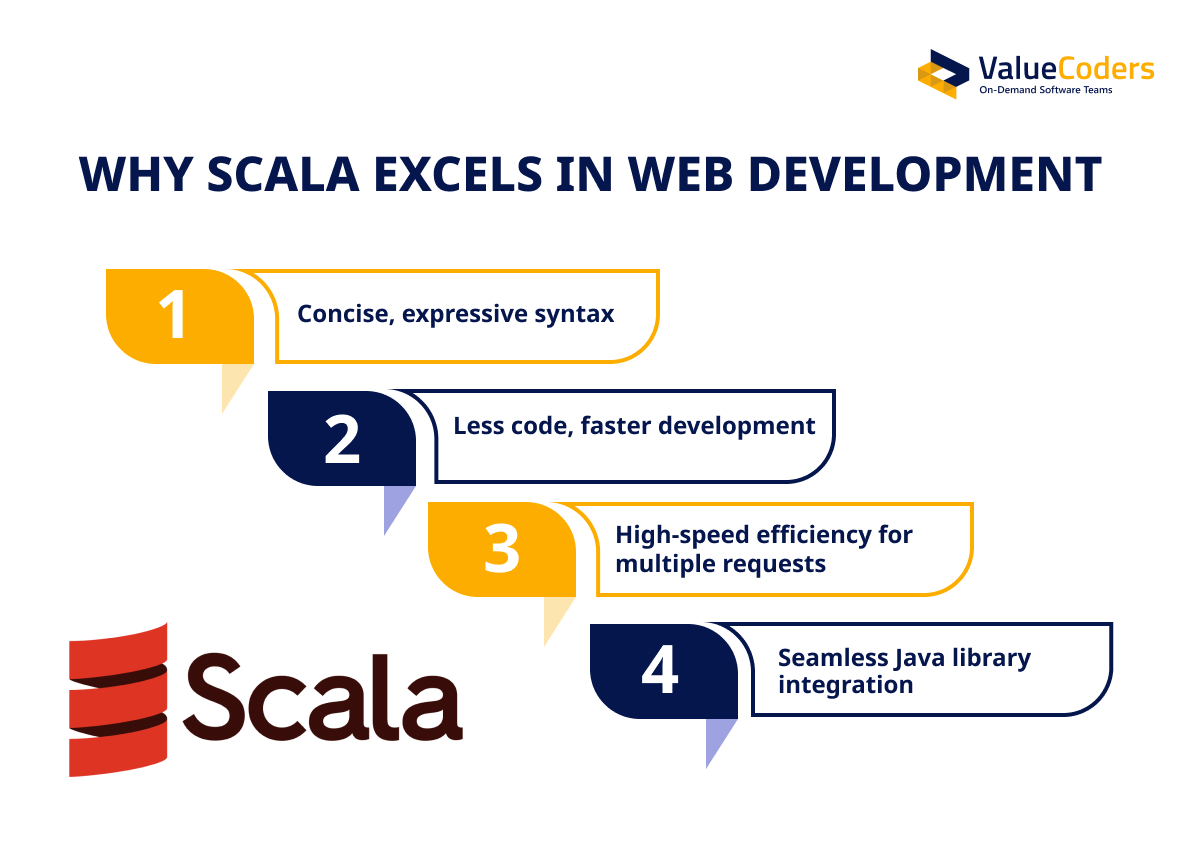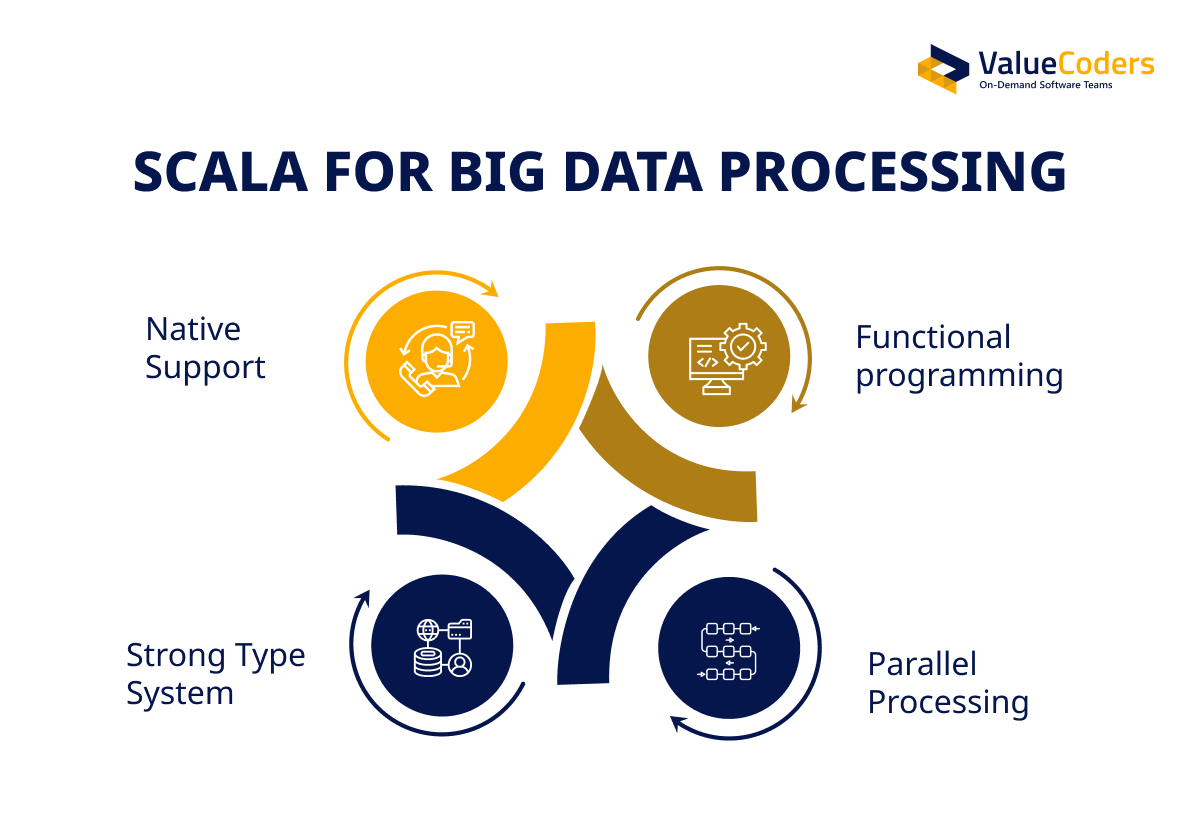Is your app struggling to handle more users? The Scala programming language might be the answer you need.
Businesses need robust, scalable technology solutions. Scala offers a powerful foundation for enterprise applications with its unique combination of features:
Features of Scala:
- Clear rules about data types that still keep code short
- Mixes both step-by-step and object-based coding styles
- Built-in tools for handling many tasks at once
- Smart ways to sort through data
- Works with Java systems your business already uses
The Scala programming language is perfect for building apps that can grow with your business. It finds mistakes early in the building process, not when your app is running with real users.
Whether you’re making small connected services, tools that process lots of data, or big websites, the Scala programming language gives you what you need to build reliable apps that work well even when busy.
Get free consultation and let us know your project idea to turn it into an amazing digital product.
What is Scala and Why Should You Consider It?
Scala is a multifunctional programming language built on the Java Virtual Machine (JVM) with full Java compatibility. Its powerful type system and concise syntax can handle everything from simple scripts to large-scale systems.
The language accelerates development and enhances efficiency through performance optimization. This is why industry leaders like Netflix, LinkedIn, and Uber utilize it.
Moreover, Scala helps tackle common enterprise problems like:
- Scaling development capacity with fewer lines of robust, maintainable code.
- Powerful concurrency for efficient real-time processing.
- Reducing costs by improving code efficiency and minimizing bugs early.
With Scala development services, you can leverage the expert service and develop a custom solution for your enterprises.
10 Powerful Scala Use Cases
Scala is a versatile tool that helps businesses solve complex problems efficiently. Here are 10 powerful Scala use cases that showcase its flexibility across industries and technologies.
1. Web Development
Scala is a reliable choice for building secure, high-performance web applications. Frameworks like Play framework Scala enable developers to create scalable, reactive web apps with ease.
What makes Scala stand out in web development:
- Concise and expressive syntax
- Requires less code, reducing development time
- High-speed efficiency for handling multiple requests
- Seamless integration with Java libraries
Big companies like LinkedIn use Scala for their back-end services to manage millions of users every day, ensuring reliability and performance at scale.
Also Read: 15 Best Web Development Technologies To Use
2. Big Data Processing
Scala programming language is the backbone of big data processing, especially as the primary language for Apache Spark, one of the most powerful big data engines. It’s designed to handle large datasets efficiently with minimal code complexity.
Key Use Cases in Big Data Processing:
- Native support for Apache Spark for real-time data analysis
- Scala functional programming makes data transformations simple
- Efficient parallel processing for large datasets
- A strong type system reduces errors in data pipelines
Uber uses Scala to power Michelangelo, its big data platform that processes real-time data to improve ride predictions, dynamic pricing, and driver performance.
For organizations looking to have similar solutions, big data consulting services can provide the necessary expertise to improve Scala’s capabilities in data processing.
3. Concurrency and Distributed Systems
Scala excels at building concurrent and distributed systems thanks to the powerful Akka framework. It handles multiple tasks simultaneously without performance degradation, making it ideal for real-time applications.
Why Scala is Great for Concurrency:
- Actor-based concurrency model via Akka
- Simplifies complex multi-threading issues
- High fault tolerance and resilience in distributed environments
- Scalable architecture for cloud-native applications
Netflix uses Scala and Akka to manage the audience and distributed infrastructure. Netflix has built a better and more interactive user experience for millions of users worldwide.
From web development to big data processing, Scala experts provide free consultation.
4. Functional Programming
Scala is the most recognized functional programming (FP) language. It offers powerful features like immutability, higher-order functions, and pattern matching to create predictable and maintainable code.
Core Functional Programming Features of Scala:
- Immutable data structures to prevent unintended side effects
- Concise, reusable code with higher-order functions
- Easier testing and debugging due to pure functions
- Strong support for parallel and concurrent processing
Twitter transitioned from Ruby to Scala to leverage functional programming, significantly improving the performance and reliability of their real-time data streaming services.
5. Middleware Development
Scala is an excellent choice for developing middleware solutions that manage communication between applications, databases, and services efficiently.
Key Benefits for Middleware Development:
- Strong type safety ensures data integrity
- High concurrency support for real-time data exchange
- Easy integration with Java-based systems
- Reliable performance for complex workflows
LinkedIn uses Scala for its middleware services to handle real-time data streaming through Apache Kafka, supporting millions of concurrent data transactions.
6. Data Science
Scala has become a powerful tool in the data science world because of its easy setup with Apache Spark developers for large-scale data analytics and machine learning.
Why Scala is Ideal for Data Science:
- Fast data processing with Spark integration
- Functional programming simplifies complex data transformations
- Strong concurrency support for real-time analytics
- High performance with large datasets
Airbnb uses Scala to build data pipelines and machine learning models, enabling personalized recommendations and optimized search results for millions of users globally.
ValueCoders offers dedicated Scala developers for seamless collaboration and faster project delivery.
7. Financial Applications
Accuracy and speed are indeed essential in accounting applications. Scala is the perfect language for building trading systems, risk management tools, and real-time analytics platforms.
Why Scala is Used in Finance:
- High-speed transaction processing for trading platforms
- Strong type safety to reduce financial calculation errors
- Scalable architecture for handling large volumes of data
- Real-time risk analysis and fraud detection capabilities
Global banks like Credit Suisse utilize Scala to develop algorithmic trading platforms and real-time risk management systems, ensuring secure and efficient financial operations.
8. Command-Line Tools and Utilities
Scala’s concise syntax and performance make it an excellent choice for building command-line tools and utilities used in system automation and DevOps workflows.
Common Use Cases for Command-Line Tools:
- Automating repetitive tasks with efficient scripts
- Handling large-scale file processing and data parsing
- System monitoring and deployment automation
- Easy cross-platform deployment with JVM support
Many tech companies develop internal DevOps tools using Scala to automate CI/CD pipelines, manage system monitoring, and streamline data migration tasks.
Also Read: What is the Future of Apache Spark in Big Data Analytics?
9. Education
Scala’s mix of object-oriented and functional programming principles makes it a popular language in the education sector, helping students grasp advanced programming concepts.
Why Scala is Great for Educational Purposes:
- Teaches both OOP and functional programming fundamentals
- Simple, clean syntax for beginners and advanced learners
- Strong community support and extensive learning resources
- Real-world applications in data science and software development
Coursera offers Scala courses in partnership with top universities, teaching students functional programming concepts and big data processing with Apache Spark.
10. Microservices Architecture
Scala is a top choice for building microservices architectures, thanks to frameworks like Akka and Lagom, which support reactive, scalable service development.
Why Scala is Ideal for Microservices:
- Asynchronous, non-blocking architecture for high-performance
- Easy scalability with lightweight services
- Strong concurrency support for handling multiple requests
- Smooth communication between services using APIs and message queues
Twitter uses Scala to build microservices that support real-time data streaming, enabling fast, reliable communication across its global infrastructure.
Get free consultation and let us know your project idea to turn it into an amazing digital product.
Conclusion
Scala’s flexibility has made it a favorite for diverse use cases. From big data to web apps, its prowess is undeniable. As the tech stack evolves, businesses see where this powerful language will take them next.
Join ValueCoders, a leading custom software development company with comprehensive big data consulting services, for efficient software solutions to handle your business challenges. Our experts build reliable, high-performance applications and custom-design solutions to ensure your needs are met.
If you are looking for a way to develop your application, schedule your call with our skilled Scala developers today.










